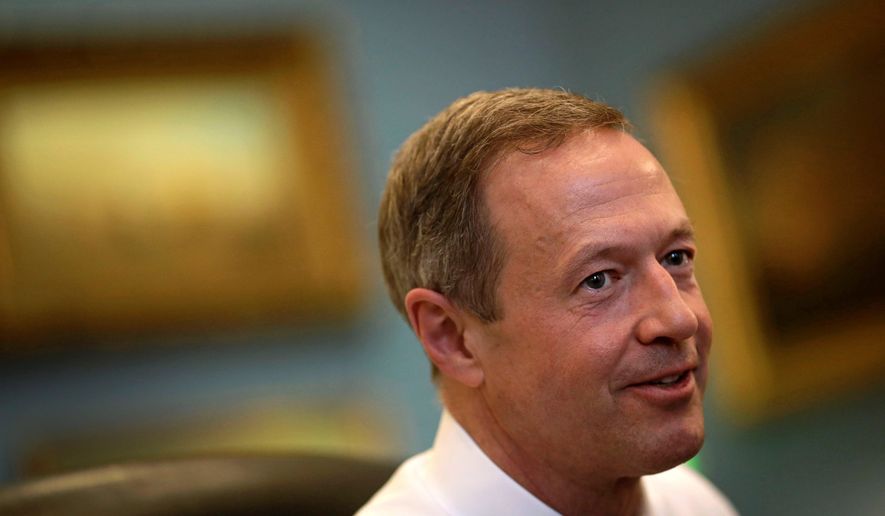Maryland Gov. Martin O’Malley has steadily climbed the political ladder over the past 15 years, but the next rung presents a seemingly insurmountable challenge as he likely positions himself as a liberal alternative to Hillary Rodham Clinton in the Democratic presidential primary.
The former two-term Baltimore mayor hasn’t officially declared his candidacy, but the formation of an O’Malley PAC and frequent trips to key presidential primary states such as Iowa and New Hampshire indicate a high likelihood he’ll seek the office.
But some political analysts say it’s not clear exactly what an O’Malley campaign will look like, or how he’ll challenge the Clinton juggernaut. Polling shows Mr. O’Malley has a steep climb, as he comes in miles behind Mrs. Clinton.
The only certainty is that he’ll come at the former secretary of state from her left flank, specialists say, possibly highlighting his support for gay marriage, marijuana reform, a higher minimum wage in Maryland and other positions that could help him with the Democratic party base.
Supporters already describe him as a successful “progressive” governor, hinting Mr. O’Malley will make a strong pitch to left-wing voters and will challenge Mrs. Clinton for the support of hard-core liberals.
“There’s plenty of room to the left of Hillary Clinton,” said Joe Shannahan, a partner with the Iowa-based public-affairs firm LS2 Group who served as communications director for former Iowa Gov. Tom Vilsack and worked on Democratic Sen. Tom Harkin’s 2002 campaign.
SEE ALSO: Rand Paul: 2016 GOP nominee could get a third or more of black vote
Mr. Shannahan said Mr. O’Malley is endearing himself to Iowa voters with his frequent stops in the state. He’s stumped for Democratic Senate candidate Rep. Bruce Braley and also has made the pitch for much lesser-known candidates at the state level.
His O’Say Can You See PAC also has staffers on the ground in eight key battleground states this cycle, including Iowa.
Last weekend, the governor delivered something resembling a presidential campaign speech as he stumped for Mr. Braley, Iowa Democratic gubernatorial candidate Jack Hatch and other candidates, and took direct aim at Republican economic policies.
“People have cast aside the trickle-down economics of the past. Not buying it, they know it’s led to this current situation. The economy grows from the middle out and the middle up,” he said.
While Mr. O’Malley is ingratiating himself with Democratic Party leaders and activists in Iowa and New Hampshire, his national appeal remains low.
A McClatchy-Marist College poll conducted late last month showed him fifth among Democratic voters at just 2 percent. That’s light years behind Mrs. Clinton’s 64 percent, and Mr. O’Malley also trailed Vice President Joseph R. Biden, Massachusetts Sen. Elizabeth Warren and even Vermont Sen. Bernard Sanders, an independent, who captured 4 percent in the survey.
SEE ALSO: Elizabeth Warren endorsement could be critical in 2016 presidential election
In his own state, Mr. O’Malley also faces problems. A Washington Post-University of Maryland poll released last week showed his approval rating at just 41 percent, and 70 percent of registered voters in Maryland say he would not make a good president. A recent survey commissioned by the Baltimore Sun found that nearly six in 10 Maryland voters say they wouldn’t back their governor in a presidential contest; 14 percent said they would.
He’s presided over dozens of tax increases, including an especially unpopular hike in the state’s gas tax, polling shows.
Furthermore, some progressives say they have yet to hear enough from Mr. O’Malley on income inequality and economic growth for the working class — issues Mrs. Warren has zeroed in on, making her a favorite on the left.
“Where is the beef, so to speak, from Martin O’Malley on these important income inequality issues?” said Neil Sroka, communications director for the progressive PAC Democracy for America. “It’s great, for instance, that he has signed a bill legalizing medical marijuana in Maryland or has been supportive of marriage equality in the state. But those aren’t going to be the defining issues in the 2016 elections. The jury is still out on where he is going to be on the issues of the day.”
Mr. O’Malley could help to cement support among progressives by, for example, prohibiting the drilling technique known as fracking before he leaves office, Mr. Sroka said. Maryland currently has a moratorium on fracking but the governor has not pursued a permanent ban.
Mr. O’Malley’s supporters surely will dispute the notion that the governor has not been a strong enough voice for income inequality and will point to the fact that he successfully pushed to raise the state’s minimum wage to $10.10, for example.
“Governor O’Malley’s strength is simple — he’s a progressive who has 15 years of executive experience and who has actually gotten results,” said Lis Smith, spokesperson for Mr. O’Malley’s PAC.
• Ben Wolfgang can be reached at bwolfgang@washingtontimes.com.




Please read our comment policy before commenting.